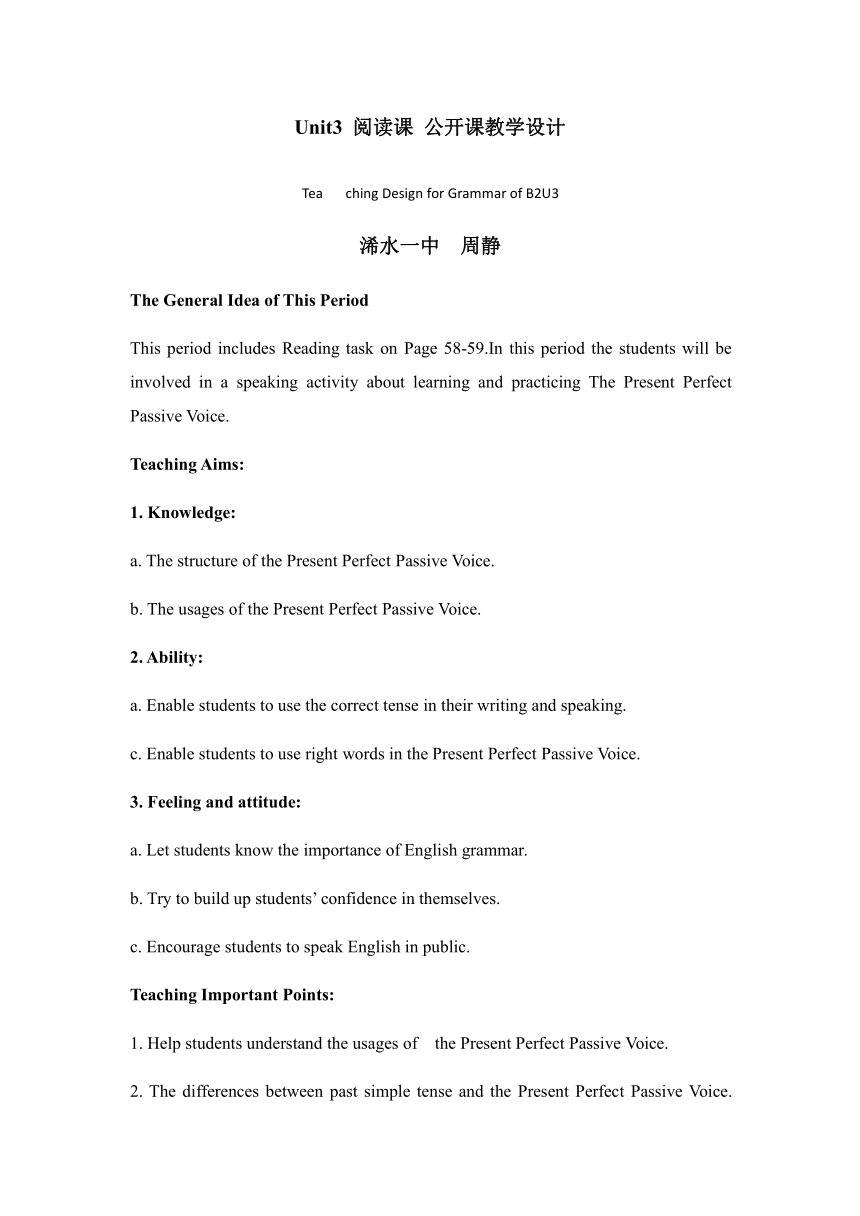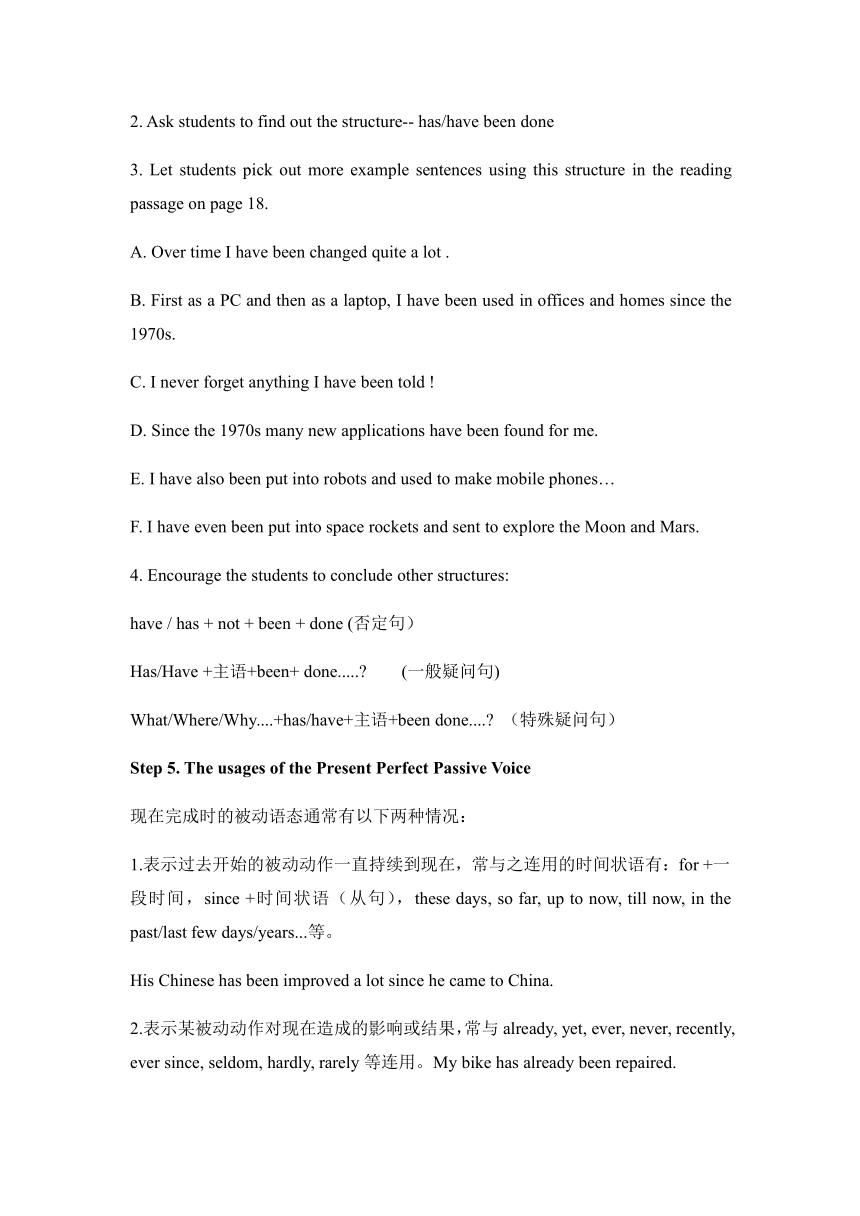人教版高一英语必修二Unit 3 Computers语法课 教学设计
文档属性
| 名称 | 人教版高一英语必修二Unit 3 Computers语法课 教学设计 |  | |
| 格式 | zip | ||
| 文件大小 | 26.0KB | ||
| 资源类型 | 教案 | ||
| 版本资源 | 人教版(新课程标准) | ||
| 科目 | 英语 | ||
| 更新时间 | 2019-12-11 09:47:49 | ||
图片预览



文档简介
Unit3 阅读课 公开课教学设计
Teaching Design for Grammar of B2U3
浠水一中 周静
The General Idea of This Period
This period includes Reading task on Page 58-59.In this period the students will be involved in a speaking activity about learning and practicing The Present Perfect Passive Voice.
Teaching Aims:
1. Knowledge:
a. The structure of the Present Perfect Passive Voice.
b. The usages of the Present Perfect Passive Voice.
2. Ability:
a. Enable students to use the correct tense in their writing and speaking.
c. Enable students to use right words in the Present Perfect Passive Voice.
3. Feeling and attitude:
a. Let students know the importance of English grammar.
b. Try to build up students’ confidence in themselves.
c. Encourage students to speak English in public.
Teaching Important Points:
1. Help students understand the usages of the Present Perfect Passive Voice.
2. The differences between past simple tense and the Present Perfect Passive Voice. Teaching Difficult Points:
How to help students use the Present Perfect Passive Voice correctly and properly. Teaching Methods:
1. Task-based learning.
2. Cooperative learning.
Teaching Aids:
1. A tape recorder.
2. A multimedia classroom.
Teaching Procedures:
Step 1 Greetings
Step 2 Revision (5 minutes)
1. Ask students to write down the past form and the past participle of the given words on the blackboard.
2. Invite some students to present their answer.
3. Practice them by reading them together.
Step 3 Lead-in
1. Encourage students to talk about some passive voice they learned before.
2. Ask them to speak out the structures of those passive voice.
3. Do some basic translation to practice.
Step 4 Presentation
1. Present the sentence--Over time, I have been changed quite a lot.
2. Ask students to find out the structure-- has/have been done
3. Let students pick out more example sentences using this structure in the reading passage on page 18.
A. Over time I have been changed quite a lot .
B. First as a PC and then as a laptop, I have been used in offices and homes since the 1970s.
C. I never forget anything I have been told !
D. Since the 1970s many new applications have been found for me.
E. I have also been put into robots and used to make mobile phones…
F. I have even been put into space rockets and sent to explore the Moon and Mars.
4. Encourage the students to conclude other structures:
have / has + not + been + done (否定句)
Has/Have +主语+been+ done.....? (一般疑问句)
What/Where/Why....+has/have+主语+been done....? (特殊疑问句)
Step 5. The usages of the Present Perfect Passive Voice
现在完成时的被动语态通常有以下两种情况:
1.表示过去开始的被动动作一直持续到现在,常与之连用的时间状语有:for +一段时间,since +时间状语(从句),these days, so far, up to now, till now, in the past/last few days/years...等。
His Chinese has been improved a lot since he came to China.
2.表示某被动动作对现在造成的影响或结果,常与already, yet, ever, never, recently, ever since, seldom, hardly, rarely等连用。My bike has already been repaired.
Never have I received his Christmas gift.
Step 6. Attention
1.现在完成时被动语态的两个助动词:have/has和been缺一不可。 The river in this village been polluted for years. The river in this village has been polluted for years.
2. 注意与一般过去时被动语态的区别。
一般过去时仅表示一个过去的动作或事实,与现在无关; 现在完成时则表示一个过去的动作对现在的影响,或一直持续到现在,与现在有关。
The machine has been repaired.机器已经修好了。(说明动作发生在过去,对现在有影响,修好了。)
The machine was repaired yesterday.机器昨天修了。(只说明动作发生在昨天。)
3. 副词的位置often, usually, always, never, hardly, seldom等副词置于have / has和been中间。
如:
[误] Such a man has been hardly believed.
[正] Such a man has hardly been believed.
4. 并不是所有动词都有被动语态
happen, take place, break out, belong to, cost, last等不及物动词或词组无被动语态。 [误] Great changes have been taken place in China since 1978.
[正] Great changes have taken place in China since 1978.
5. 短语动词不可分割或省略其中的介词或副词。
The patients have been taken good care of.
The tough matter has been dealt with properly.
6. 一些特殊动词, 如borrow, finish, begin, buy, start, return, marry, open, join等构成的现在完成时的被动语态不能与表示一段时间的状语连用。若要表达相应的意思,则需改换动词或时态。如:
My brother has had (不能用has bought) this bike for almost four years. How long has this book been bought? How long ago was this book bought?
Step 7. Exercises
Let the students do some exercises to check, practice and revise.
A.句型变换。
1. My friend has bought a new personal computer.
——A new personal computer has been bought by my friends
2. The shop has repaired my computer very quickly.
——My computer has been repaired by the shop very quickly .
B.用词造句。
C.完成句子。
1. Since he was born, he _____________ in the small town. (live) 自从出生以来,他一直在这里住着。
2. More than 30 Hope Primary Schools _________________all over China in the past 5 years. (build)
在过去的五年里,全中国已经建立了30多所希望小学。
3. It is the first time that the EXPO _________________ in a developing country. (hold)
这是第一次在发展中国家举办世博会。
4. Over the past five years, this small town ________________ twice by earthquakes. (hit)
在过去的5年内,这个小镇发生了两次地震。 D.单句改错。
1. Tom's novel has been not published.
2. The computer was used every day since we bought it.
3. David and Lucy married for 3 years.
4. The injured bird has been looked since it was saved.
5. A good idea has been come up at the meeting.
Step 8. Summary$ Homework
1. Summary
In today’s class, the students learned the structures and usages of the Perfect Passive Voice and do some training.
2. Homework
Do the grammar exercise on ChangJiang Book.
